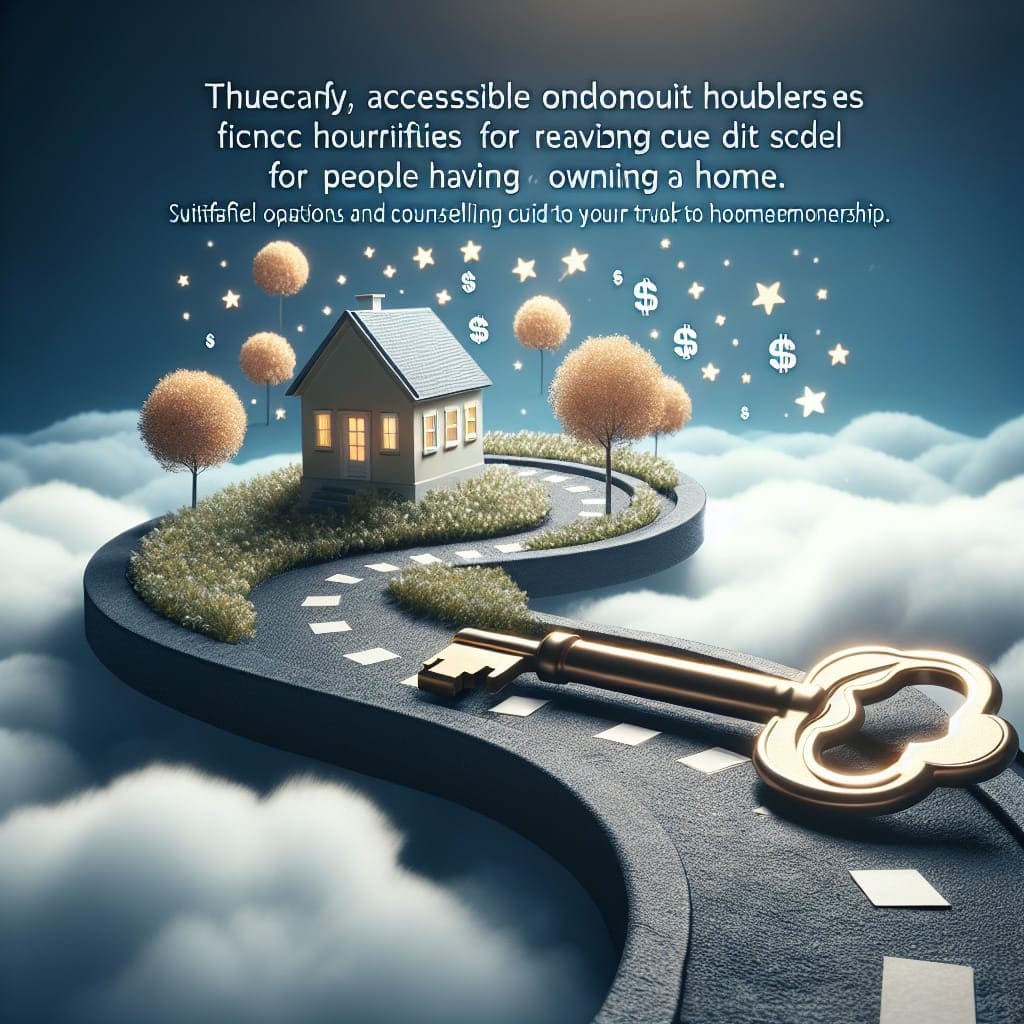Are you dreaming of owning a home but worried about your bad credit standing in the way? Don't fret! This article explores the various options available for securing a home loan even with bad credit. Whether you're a first-time buyer or looking to refinance, there are solutions out there tailored to fit your unique financial situation. So, let's dive in and discover the possibilities that can turn your homeownership dreams into a reality!
Options for Home Loans with Bad Credit
/itgcAFNe35Q” frameborder=”0″ allowfullscreen>
Understanding Bad Credit
Having bad credit can be a roadblock when it comes to securing a home loan. Bad credit is typically defined as having a low credit score, which is often the result of missed payments, high credit utilization, or even a history of bankruptcy. However, having bad credit doesn't mean you're out of options when it comes to getting a home loan. There are several options available to help you navigate the process and achieve your dream of homeownership.
Importance of Credit Scores
Before delving into the various options for home loans with bad credit, it's important to understand the significance of credit scores. Credit scores play a crucial role in the mortgage approval process, as they demonstrate your creditworthiness to lenders. A higher credit score typically indicates a lower risk for lenders, making it easier for you to secure favorable loan terms and interest rates. Conversely, a lower credit score can make it more challenging to obtain a home loan and may result in higher interest rates or stricter borrowing criteria.
Conventional Home Loans
Conventional home loans are a common option for borrowers with good credit, but they can also be accessible to those with bad credit, albeit with some limitations. Two types of conventional home loans worth exploring are fixed-rate mortgages and adjustable-rate mortgages (ARMs).
1. Fixed-Rate Mortgages
Fixed-rate mortgages are a popular choice for many homebuyers, including those with bad credit. With a fixed-rate mortgage, the interest rate remains the same throughout the entire loan term, allowing for predictable monthly payments. This stability can be particularly beneficial if you are on a tight budget or prefer to know exactly how much you'll be paying each month.
Pros
- Stability: With a fixed interest rate, your monthly mortgage payments will remain the same over the life of the loan, providing you with financial stability and predictability.
- Budgeting: Knowing your exact mortgage payment amount can help you effectively budget for other expenses and plan your financial future.
Cons
- Potentially Higher Interest Rates: If your credit score is low, you may be subject to higher interest rates on your fixed-rate mortgage compared to borrowers with better credit.
- Limited Flexibility: Fixed-rate mortgages offer little flexibility in adjusting your interest rate if market conditions change.
2. Adjustable-Rate Mortgages (ARMs)
Adjustable-rate mortgages, or ARMs, are another option to consider if you have bad credit. Unlike fixed-rate mortgages, ARMs have an interest rate that changes periodically. Typically, ARMs start with a fixed introductory rate for a certain period, after which the rate adjusts based on prevailing market conditions.
Pros
- Lower Initial Rates: ARMs often have lower initial interest rates compared to fixed-rate mortgages, which can make them more affordable in the short term.
- Potential Rate Decrease: If interest rates decrease, your adjustable-rate mortgage could offer lower monthly payments as your rate adjusts downward.
Cons
- Rate Fluctuations: The main downside of ARMs is the uncertainty that comes with potential rate fluctuations. If interest rates rise, your monthly payment could increase significantly.
- Budgeting Challenges: Unlike fixed-rate mortgages, ARMs make it more challenging to budget for the future, as your monthly mortgage payment can vary over time.
FHA Home Loans
Another option for individuals with bad credit is a Federal Housing Administration (FHA) home loan. The FHA is a government agency that insures loans provided by private lenders, making it easier for individuals with less-than-perfect credit to obtain a mortgage.
1. Advantages of FHA Loans
FHA loans offer several advantages for borrowers with bad credit:
Lower Credit Requirements
FHA loans have more lenient credit requirements compared to conventional loans, making them accessible to individuals with lower credit scores.
Low Down Payment
FHA loans require a down payment as low as 3.5% of the purchase price, which can be especially beneficial for first-time homebuyers who may not have substantial savings.
Flexible Qualification Criteria
FHA loans take into account other factors besides credit scores, such as employment history and income stability, allowing for more flexible qualification criteria.
2. Disadvantages of FHA Loans
While FHA loans can be advantageous, there are a few potential drawbacks to consider:
Mortgage Insurance Premium (MIP)
FHA loans require borrowers to pay a mortgage insurance premium, which adds to the overall cost of the loan. This insurance provides protection to lenders in case the borrower defaults on their mortgage.
Property Limitation
FHA loans have certain property limitations, such as requiring the property to meet specific standards in terms of safety and habitability. This could limit your options when it comes to choosing a home.
VA Home Loans
If you're a current or former member of the military, you may qualify for a VA home loan. VA loans are backed by the U.S. Department of Veterans Affairs and can be a favorable option for individuals with bad credit.
1. Benefits of VA Loans
VA loans offer several benefits for borrowers with bad credit:
No Down Payment
One of the most significant advantages of VA loans is that they typically require no down payment, making homeownership more accessible for veterans and active-duty service members.
Less Strict Credit Requirements
VA loans have more lenient credit requirements compared to conventional mortgages, providing increased opportunities for those with bad credit to secure a home loan.
Lower Interest Rates
Because VA loans are backed by the government, lenders often offer lower interest rates compared to other loan options, potentially saving you money over the life of the loan.
2. Eligibility Criteria for VA Loans
To be eligible for a VA loan, you must meet certain criteria:
Service Requirement
To qualify for a VA loan, you must have served a minimum period of time in the military, typically ranging from 90 days to 2 years depending on specific circumstances.
Certificate of Eligibility
Obtaining a Certificate of Eligibility from the Department of Veterans Affairs is necessary to prove your qualification for a VA loan. This certificate verifies your military service and determines your eligibility for the program.
USDA Home Loans
USDA loans are an option for individuals with low to moderate incomes who are looking to buy a home in rural areas. While credit requirements may not be as strict as conventional loans, USDA loans offer unique advantages for borrowers with bad credit.
1. Advantages of USDA Loans
USDA loans provide several advantages for borrowers with bad credit:
No Down Payment
Similar to VA loans, USDA loans require no down payment, making homeownership more attainable for individuals with limited funds.
Low Interest Rates
USDA loans have competitive interest rates, potentially saving you money over the life of the loan compared to other loan options.
Flexible Credit Requirements
While a minimum credit score is required for USDA loans, the credit requirements are more lenient compared to conventional loans, allowing individuals with bad credit to qualify.
2. Eligibility Criteria for USDA Loan
To be eligible for a USDA loan, you must meet specific criteria:
Income Limitation
USDA loans are designed for individuals with low to moderate incomes. There are income limitations based on your location and household size.
Geographic Location
USDA loans are intended for properties located in rural areas or eligible suburban areas. Ensuring that your desired home fits within the designated areas is crucial for USDA loan eligibility.
Alternative Lenders
In addition to traditional lenders, there are alternative lending options available for individuals with bad credit. These lenders often consider factors beyond credit scores when evaluating loan applications.
1. Peer-to-Peer Lending
Peer-to-peer lending platforms connect borrowers directly with individual lenders, bypassing banks and traditional financial institutions. These lenders assess borrowers based on various criteria, which can include factors such as income, employment history, and overall financial situation.
Approval Process
The approval process with peer-to-peer lending often involves submitting an application on the platform, providing detailed information about your financial situation, and waiting for individual lenders to review your loan request.
Interest Rates
Interest rates with peer-to-peer lending can vary depending on your creditworthiness and the overall demand for loans on the platform. Be sure to compare rates and terms from multiple lenders to secure the most favorable deal.
2. Private Lenders
Private lenders, such as hard money lenders, bridge loan lenders, and equity-based lenders, offer alternative options for borrowers with bad credit who may not qualify for traditional loans.
Hard Money Loans
Hard money loans are typically short-term loans used for real estate investments. These loans focus more on the value of the property being purchased rather than the borrower's credit score.
Bridge Loans
Bridge loans provide temporary financing until a more permanent solution is available. These loans are commonly used to bridge the gap between purchasing a new home and selling an existing one.
Equity-Based Loans
Equity-based loans use the equity in your current property as collateral, making your credit score less of a determining factor when qualifying for the loan.
Improving Credit Score
If you have bad credit, it's important to work towards improving your credit score for future financial endeavors. While there are no quick fixes, implementing the following strategies can help you gradually rebuild your credit:
1. Paying Bills on Time
Consistently paying your bills on time establishes a positive payment history, which is crucial for improving your credit score. Set up automatic payments or reminders to ensure you don't miss any due dates.
2. Reducing Debt
Reducing your overall debt load can positively impact your credit score. Focus on paying off high-interest debts first and utilize strategies such as the debt snowball or debt avalanche to accelerate your progress.
3. Establishing a Positive Payment History
In addition to paying bills on time, establishing a positive payment history with different types of credit can strengthen your credit profile. Consider opening a secured credit card or applying for a credit-builder loan to diversify your credit mix.
4. Keeping Credit Utilization Low
Credit utilization refers to the amount of available credit you're using. Aim to keep your credit utilization below 30% to demonstrate responsible credit management.
5. Checking and Correcting Credit Report Errors
Regularly check your credit reports for any errors or inaccuracies that could negatively impact your credit score. Dispute any discrepancies you find and follow up with the credit reporting agencies to ensure they are corrected.
Conclusion
While bad credit can present challenges when it comes to securing a home loan, there are many options available to help you fulfill your dream of homeownership. Understanding the different types of loans and their specific requirements can empower you to make informed decisions. Additionally, taking steps to improve your credit score can increase your chances of qualifying for more favorable loan terms in the future. Remember to explore alternative lenders, such as peer-to-peer platforms and private lenders, as they may offer additional opportunities for individuals with bad credit. With determination and the right knowledge, you can overcome a bad credit history and achieve your goal of owning a home.






![Read more about the article Common Affiliate Marketing Mistakes To Avoid With [specific Platform]](https://b3753637.smushcdn.com/3753637/wp-content/uploads/2024/04/common-affiliate-marketing-mistakes-to-avoid-with-specific-platform-1-300x171.jpg?lossy=2&strip=1&webp=1)